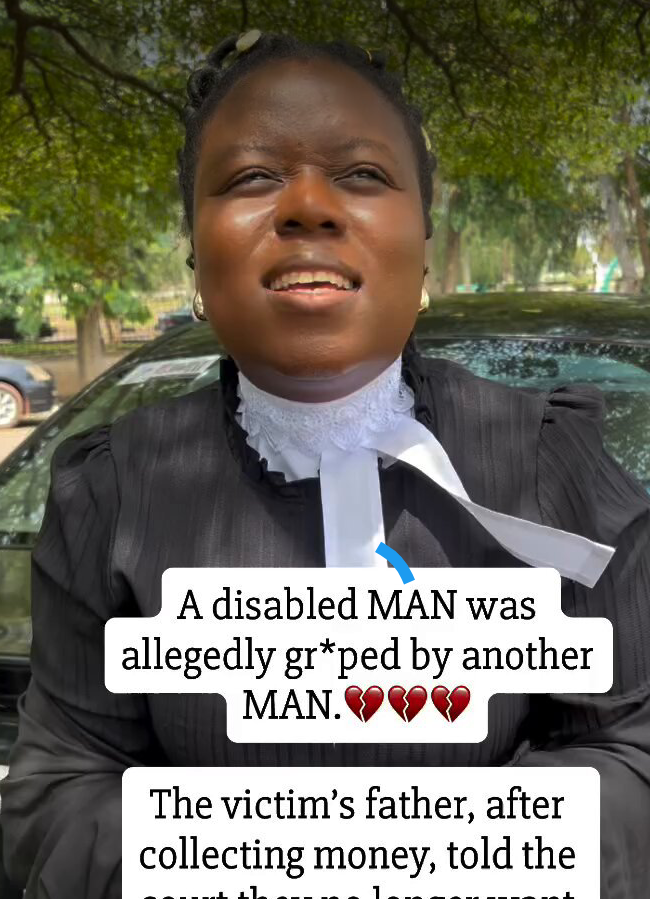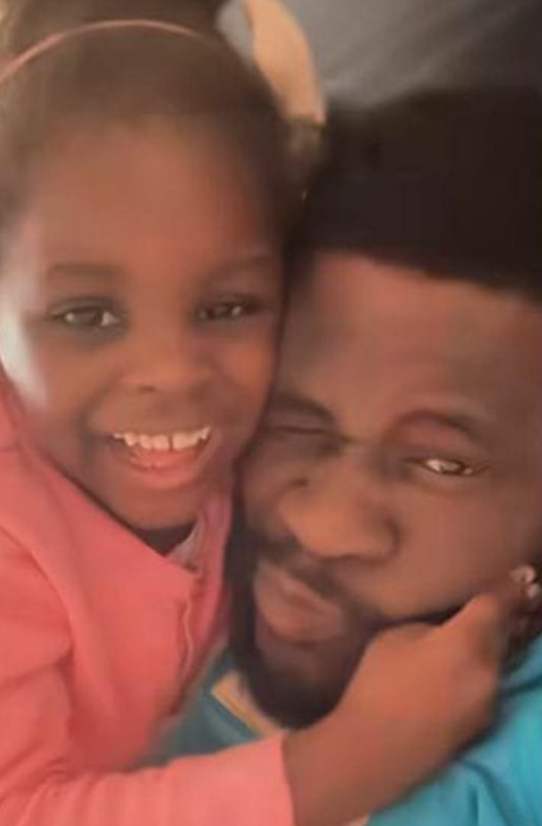

A Nigerian lawyer has taken to social media to express deep frustration over what she described as one of the most heartbreaking and infuriating cases she has handled—a case involving a physically disabled man who was allegedly r*ped by another man, only for his father to withdraw the case from court after allegedly collecting money from the accused. The revelation has sparked outrage online, reigniting conversations about justice, corruption, and the vulnerability of people living with disabilities in Nigeria’s legal system.
According to the lawyer, the incident began when the disabled victim, whose identity remains withheld for his safety and dignity, was allegedly assaulted by a man in their neighborhood. The victim’s disability made him an easy target, and the lawyer explained that the act was both violent and deliberate. The case, she said, was already in court and seemed to be progressing, with witnesses willing to testify and the evidence against the suspect reportedly strong enough to sustain prosecution.
However, the situation took a disturbing turn when the victim’s father appeared in court to declare that the family was “no longer interested” in pursuing the matter. The lawyer said she was left speechless when the father made the statement, despite the nature of the crime and the fact that it involved his own son, who could not properly defend himself due to his physical condition. The father’s decision reportedly came after he allegedly accepted money from the accused’s family—a bribe that effectively silenced the pursuit of justice and led to the collapse of the case.
The lawyer, clearly angered and disillusioned, shared her experience to highlight the systemic failures that enable such tragedies. “It’s heartbreaking,” she said in her post. “A disabled man was violated in the most dehumanizing way, and instead of standing up for him, his father took money and told the court they were no longer interested in justice. What kind of society are we living in?” Her post quickly went viral, drawing thousands of reactions from Nigerians who were equally appalled by the story.
Many commentators described the incident as another grim example of how poverty, ignorance, and corruption continue to undermine justice in the country. Others expressed sympathy for the victim, questioning what kind of emotional and psychological trauma he must now endure—betrayed not just by his abuser, but also by his own family and a justice system that could not protect him. Human rights activists joined in the outcry, demanding an investigation into the alleged payoff and urging authorities not to allow the case to die, despite the withdrawal statement from the victim’s father.
“What we are seeing is not just a legal issue, it’s a moral collapse,” said one human rights advocate. “A disabled person is among the most vulnerable members of society. When such a person is violated, the law has a duty to act, whether or not the family chooses to withdraw. This case must be pursued to the end, because it is about more than one victim—it’s about what we stand for as a society.”
The case has once again drawn attention to the alarming rate at which victims of sexual violence—particularly those from poor or marginalized backgrounds—are denied justice in Nigeria. In many instances, families withdraw cases after being “settled” financially by perpetrators or their relatives. This practice, though illegal and unethical, continues to thrive due to weak enforcement, cultural silence, and economic hardship. Many families, faced with poverty and societal stigma, see financial compensation as an easier route than facing long and expensive court battles.
The lawyer handling this particular case expressed how emotionally draining it was to see her efforts undermined. “I’ve handled tough cases before, but this one broke me,” she wrote. “Because the victim couldn’t even speak for himself, he trusted us to fight for him. And then his own father sold that fight for a few naira. I can’t even begin to describe the pain.”
Online, Nigerians reacted with a mix of fury and sorrow. Some blamed the father for betraying his son’s trust and dignity. Others pointed to the justice system itself, arguing that if victims and their families had confidence in the courts, they wouldn’t resort to private settlements. “The system has failed people so much that they don’t believe justice is possible,” one commenter wrote. “When justice becomes a luxury, corruption becomes the only currency.”
This case has also reignited discussions about the protection of persons with disabilities in Nigeria. Activists say the government’s 2018 Discrimination Against Persons with Disabilities (Prohibition) Act remains largely unenforced, and many disabled Nigerians continue to suffer neglect, abuse, and social exclusion. “When a disabled person is r*ped, society should be outraged, not silent,” another lawyer commented. “This is not just about the law—it’s about humanity.”
Calls have now intensified for the Ministry of Justice and the National Human Rights Commission to take over the matter and ensure it is properly investigated. Legal experts have noted that, under Nigerian law, certain offences—especially those classified as sexual or violent crimes—are considered offenses against the state and cannot be withdrawn at will by private individuals once they reach a certain stage in court. “If the prosecution has already commenced, the state should continue the case, regardless of the victim’s family’s withdrawal,” one senior legal analyst explained. “The father’s statement should not automatically end the trial.”
The incident has also drawn attention to the psychological toll on lawyers and human rights defenders who handle such sensitive cases. Many public interest lawyers in Nigeria work under immense emotional stress, often with little or no pay, in environments where threats, intimidation, and corruption are rampant. The lawyer’s outburst online revealed the heavy emotional burden she carries, a reminder that those who fight for justice in such cases often do so at great personal cost.
As the outrage spreads, pressure is mounting on law enforcement agencies and the judiciary to step in and demonstrate that justice cannot be bought. Nigerians across social media are calling for the accused to be re-arrested and the father investigated for allegedly taking a bribe to sabotage the case. “This cannot be swept under the carpet,” one user wrote. “If we let this go, then what hope is there for other victims who cannot speak or fight for themselves?”
The story of this disabled man and his silenced voice now stands as a painful symbol of how deeply broken parts of the justice system remain. It exposes not just a single act of evil, but a chain of failures—from the accused’s cruelty to the father’s betrayal and the society’s complacency. While the lawyer’s courage in speaking out has sparked outrage and awareness, the real test lies ahead: whether the Nigerian justice system will finally rise above money and influence to defend the voiceless.
In the end, this is more than a legal case. It is a mirror reflecting how society treats its weakest members. And until that reflection changes, justice will remain a privilege—bought by the highest bidder, and denied to those who need it most.
A lawyer shared her frustration over a case where a disabled man was allegedly g r ā p 3 d by another man. The victim's father, after allegedly collecting money, told the court they were no longer interested in pursuing justice. pic.twitter.com/PqIVoNwaa5
— 𝐀𝐬𝐚𝐤𝐲𝐆𝐑𝐍 (@AsakyGRN) November 1, 2025


